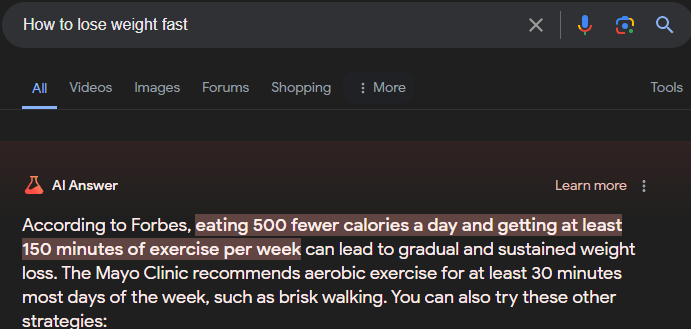With the official launch of AI Overviews across the globe and its imminent arrival in the UK, companies – and SEO agencies – need to be adapting to this new search world now. And one way to make sure they are seen in AI Overviews is by having the correct schema mark-up.
AI Overviews, formerly called SGE – is the new search experience that adds AI generated results to the top of the SERP. It uses AI to create bespoke summaries/answers for your give queries based on multiple sources across the web.
This blog will help you optimise your site to rank better within Google’s search generative experience (SGE) – now called AI Overviews – through the use of schema markup.
Why is schema mark-up important?
Schema mark-up – or structured data – helps establish you or your business as an entity for Google. It is code in your site used to help identify key attributes and link them to topics. Basically, it helps provide a context to your content.
Schema markup continues to be a focus for Google, who have recently (February 2024) added structured data support for product variants, as well as providing new documentation for structured data carousels (which appear within SGE results).
The following quote and example, directly from Google, helps explain why they deem it important:
“You can help us by providing explicit clues about the meaning of a page to Google by including structured data on the page.
“For example, on a recipe page, what are the ingredients, the cooking time and temperature, the calories, and so on.”
To build on this example, you might be a ‘York based men’s hairdresser’. Schema make-up can make sure that Google understands:
- Location: You are based in York
- Industry: You’re in the hair and beauty sector
- Offering: You offer men’s haircuts, not women’s
Or, from a personal level, you might be a ‘solicitor for Lawyers Ltd who specialises in tax law and regularly posts about it on your social channels.’
Schema could help Google know:
- Your name
- Company you work for
- Industry
- Areas of Expertise
- Your social channels
- And how those channels connect to your website bio page
Read more about what schema mark-up is.
How schema markup can help you appear in AI Overviews
As schema markup gives information to search engines so they can better understand your webpage and provide context for your content, it’s a vital tool to help rank in AI Overviews.
A properly marked up site helps you to appear in these AI answers by telling search engines what your website data means (not purely what it says) so they can accurately interpret the content.
Schema also helps you build trust with Google. A well marked-up site is more trusted by Google than a poorly marked-up site. This is because Google can quickly and easily verify your site if you provide links to external reviews, social channels etc. through schema.
For example, schema can help SGE to understand:
- What your images or videos are
- What your business address is
- What your products specifications are
- Who the author of an article is
- Which social channels are related to your company
- Which reviews are for you
This will all help you to be in the best position to take advantage of AI Overview when it rolls out in the UK.
What types of schema markup should be used?
There are many elements that you should be marking up, so you should carefully review the content across your site to identify the key elements to highlight.
The below are the top types of schema markup to add to help improve your visibility in AI Overviews.
- Organisation: Let Google know about your organisation’s admin details such as logo, address, contact details, social profiles.
- Breadcrumb: This will help search engines understand the hierarchy of the website and the relationship between pages.
- Article: Let Google know what the title is, who the author and publisher is, when it was published, and more.
- Product: Let Google know the products details: its name, reviews, aggregate rating, offers, price, currency, availability, and more.
- FAQ: Help Google understand the frequently asked questions and answers on the topic of your webpage.
- Local Business: Let Google know about your opening hours, shop departments, customer reviews, and more.
- Person / Profile page: Help Google to highlight information about who has created certain content and their experiences and expertise.
If you have questions relating to SEO, SGE or schema markup, get in touch with Edge45® and we’ll be happy to help.
